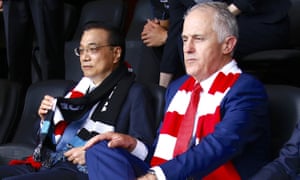Last week, Australian Prime Minister Malcolm Turnbull took visiting Chinese Premier Li Keqiang to a game of Australian rules football. *The crowd booed them both loudly. It was the third jarring reminder to Mr. Li of the perils of democracy, Australian style.
Some days earlier, at a strategic studies conference in Singapore, Foreign Minister Julie Bishop somewhat gratuitously told China that it could only reach its full economic potential if it went further to embrace democracy. And this week, an unprecedented alignment across Australia’s political spectrum combined to reject the “ratification” of Australia’s extradition treaty with China, widely seen as a victory for human rights.
When it comes to China, the tension in Australia between morals and mammon is omnipresent, as are tensions between our trade and strategic interests. Still, it was unexpected that a treaty of importance to China would be shot down. For Mr. Turnbull, it was yet another political miscalculation.
Australia and China are becoming economically intertwined, but politically and strategically, we are at best uneasy and often conflicted. Chinese assertiveness in the South China Sea is a profound concern, though we have become more cautious in saying so. Our free-trade agreement with China, negotiated a year ago, adds to both the possibilities and the tensions in bilateral relations.
The extradition agreement was negotiated in 2007, together with a deal on prisoner swaps. It was signed in the dying days of the conservative John Howard government, then left to languish for nine years and five prime ministerships. China, at the highest level, has regularly requested its implementation. Final ratification began a year ago.
The government majority on the parliamentary committee predictably gave its approval, though through gritted teeth. It welcomed “… the human-rights safeguards provided … but … cannot dismiss concerns over the lack of transparency of Chinese justice system, allegations of the ill-treatment and torture of prisoners, and the continuing imposition of the death penalty.” The opposition Labor Party rejected signature at least until the legislative framework to govern Australia’s extradition policy is comprehensively reviewed. If this happens, the treaty will probably need to be re-negotiated, something China is unlikely to accept.
Australians get regular reminders of the workings of the Chinese justice system. The courts and the Communist Party work in lockstep. Currently, 15 employees of an Australian casino operator of varying nationalities are in jail, as yet not charged. When they are, they will be convicted of whatever. As Mr. Li was departing Australia, news broke that an outspoken Chinese academic, Feng Chongyi, a Chinese citizen but Australian permanent resident, had been stopped from leaving China, apparently under investigation for “endangering state security.”
Mr. Feng has criticized Chinese government control of Chinese student organizations in Australia and other forms of influence peddling. Of concern are donations by Chinese property developers to both main political parties, a Chinese businessman covering the travel outlays of one outspoken “powerbroker” in the senate, and China’s funding of some centres for academic research. More subtly, and with due disclaimers, the leading Australian financial paper now runs a regular insert provided by the Chinese government.
Bilateral trade had grown rapidly before Australia and China concluded a free-trade agreement (FTA). It’s negotiation was undertaken in great haste: the former Abbot government set itself a deadline and imprudently met it. The scope, complexity and intrusiveness of these so called “trade” agreements is becoming ever wider, their societal reach more profound. In Australia, what hasn’t kept up is the public (or parliamentary) consultation, and drawing out in advance the implications and likely consequences.
In crude terms, the deal in the FTA was that in return for limited improvements in our market access into China, Australia relaxed vetting of Chinese investment in Australia. That’s a sensitive trade-off.
It’s too early to say what, if anything, the FTA will deliver, trade-wise. Australian exports to China are actually down. But hope springs eternal and all else involving China is being judged against the trade relationship. This means our sensibilities can be easily tweaked. Channelling Donald Trump, Mr. Li noted that Australia currently runs a $50-billion trade surplus with China.
The sources of tension in the FTA are many. Purchases of land and property are one area causing growing public unease, along with infrastructure proposals. A recent poll says 87 per cent of Australians are opposed to foreign purchases of farm land. Beggaring belief, a Chinese firm with military connections was allowed to take over the management of our northernmost port of Darwin. Other infrastructure investment proposals since have been rejected.
As do all countries in negotiations, China will point to what it’s agreed with others, including Australia. If Canada is to draw one conclusion from Australia’s experience, it’s for political leaders to take the Canadian people with them, openly, in advance. Both with trade and extradition, Australia is already paying a price for not doing so.

No comments:
Post a Comment
Comments always welcome!